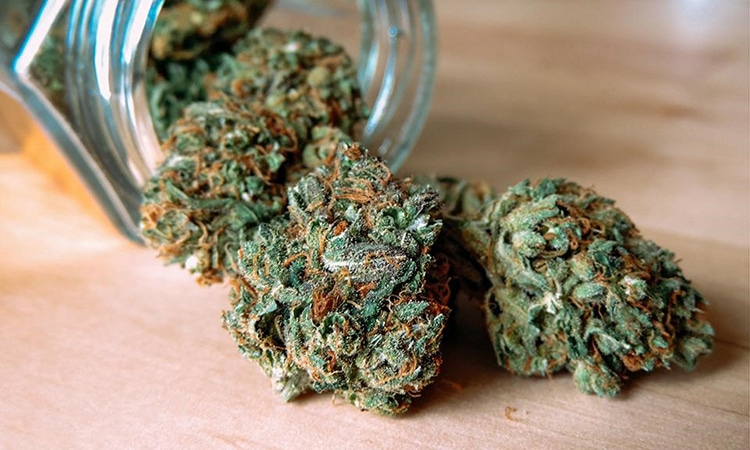Black Thought was midway through another episode of The Tonight Show Starring Jimmy Fallon with his band The Roots, a typical Tuesday—at least for him. This time, Fallon was having him freestyle about various audience members for a segment called “Freestylin’ with The Roots.” He rapped off the cuff about a guy who was convinced artificial intelligence is going to ruin the world, an 18-year-old from Tampa, Florida who swore he was an “adult,” and Mark Miller from Indianapolis whose family is competitive about losing weight. Black Thought cracked a few smiles behind his tinted sunglasses and black fedora as the audience roared with laughter, likely unaware of what he’s endured over the last 50 years.
Born Tariq Trotter in Philadelphia, Black Thought suffered a series of tragedies before he even finished high school. His father was murdered before he was a year old, forcing him to grow up with a single mother who battled a crack-cocaine addiction. When he was 6, he accidentally lit his family’s apartment on fire, prompting a visit from the local fire department. His older brother accused the firefighters of pocketing jewelry and destroying some family photos, and a fight ensued. His brother wound up getting arrested, sparking a series of subsequent jail visits. By the time Black Thought got to high school, he was selling crack-cocaine as a means to make money. Once his uncles found out, they shipped him off to Detroit for a new start. When he returned, his mother—still hooked on drugs—went missing. She ultimately turned up at the morgue, having been stabbed to death by a 22-year-old Philly man who lived just a few blocks away from her.
Through all of this, Black Thought found music, more specifically hip-hop. He poured all of his pain, grief, sorrow, love, and every other possible human emotion into his extensive catalog with The Roots as well as his solo work. More recently, he put pen to paper for his first memoir, The Upcycled Self: A Memoir on the Art of Becoming Who We Are, which was released in November 2023 and quickly became a New York Times Best Seller. It was a way for him to honor a very conscious decision to be more honest and candid about himself and his journey.
“It was the idea of just getting it out there, which is always a trust fall,” he says. “If there is any transaction, any energy energetic exchange in that fall, right, I feel like it’s still taking place. Even though the story is in the book and the information is there, it focuses on such a specific part of my life and specific relationship dynamics that I know there’s so much more of a story to tell.”
As cathartic as purging negative emotions can be, it’s still no easy task. At one point in the book, Black Thought reflects on finding his mother in a crack den and unsuccessfully trying to pull her out. It was only later he realized he’d developed post-traumatic stress disorder (PTSD) from the entire experience. Somehow, he still managed to carve out a beautiful, fruitful life for himself, the very definition of the “upcycled self.”
“So much happened to me and around me in such a short period of time, and that remains the case,” he admits. “So much so that I can’t even tell you the point at which I became as numb as I am now to loss, which isn’t always healthy… a few years ago, that time still represented the beginning of a self-discovery. I think the pandemic worked in my favor in that way because it gave me time for introspection and to continue to work, but in a different way.”
The world stopped for nearly everyone in 2020 as the COVID-19 pandemic made its rampage. Artists were suddenly grounded, unable to tour. The concert industry fell to its knees, at the mercy of an invisible monster. But during that period of downtime, Black Thought found therapy and discovered how to become “wise as opposed to wounded.” As he dissects in the book, the arts proved to be his saving grace and helped him digest the horrific events that ultimately shaped him.
“I’ve always talked about how I’ve seen that as my salvation because it presented me with that avenue, that outlet,” he says. “There’s a certain amount of aggression, anger, beef, and all the things associated with it. But I think the biggest jewel for me that I’ve walked away from this process with is the knowledge of the significance of working through the shit.
“As someone who’s always been fiercely private, I don’t know that is always the best policy. You have to talk to someone, right? If you’re not going to go to therapy, and if you don’t have that shoulder to lean on, that person to listen from the right perspective and offer you the right advice, the arts—or any hobby—are great. Mastery of a thing is a great way to work through it. Because I’m able to be selective in the projects that I accept, I try to accept the projects that are going to help me rise to that same challenge. Whether it’s music or a book, it’s all the same sort of thing. It’s using different muscles to serve the same greater good.”
Still, Black Thought had to work through a lot of anger to get to a place of peace, not uncommon when it comes to grief. Again, it was music that provided a lifeline.
“I was definitely angry,” he says. “Because I was so young—I lost my mother between 15 and 16 years old in 11th grade—I believe, even in that, I was mentally mature. But I was young in my years. I discovered Bob Marley, Nina Simone, and got into James Brown really heavily, three artists who had such extensive discographies and who were so dynamically different but all outspoken, profoundly political in their own ways, and that was huge. It helped me get over some of the grief and anger that I felt at that time.”
Even Black Thought was surprised at how well he handled it. After all, he’d made up his mind that if another catastrophic event happened in his life, he’d “go batshit crazy” and “be all the things that people are when they fly off the hinge in dealing with loss.” Fortunately for him, he wasn’t compelled to act out and, instead, focused on the blossoming career of The Roots.
“I’m definitely thankful for the mentorship that I had,” he adds. “I didn’t have a live-in role model, like a father figure in the home, but in the extended community, I had many examples that I’m super thankful for.”
Black Thought turned 50 last year, a number he didn’t necessarily expect to see: “Who at 50 isn’t imprisoned or dead? I feel like there were a couple generations that because of Jim Crow and the Civil Rights movement, drugs, the War on Drugs, and crack epidemic—there were a couple of generations that were just lost to that. That was my representation. That’s the era that I come from. That’s the place in time that I’m from. So my peers, my classmates, my neighbors, my family members, they all met the same end.”
Despite his mother’s plight, Black Thought hasn’t wrestled with substance abuse and lives by the rule “all things in moderation.” He also believes education is key when addressing drugs and alcohol with the younger generation, but he’s not naive to their pitfalls.
“Everything isn’t for everyone and everybody isn’t going to be able to function under the influence,” he says. “I take long periods of my life where I fast from all things addictive—social media, drugs, alcohol, whatever. Sometimes I go for a year, two years, three years at a time.
“There’s something to be said about having a drink or smoke and then going into the booth or to the drawing board. But when I’m on a cleanse or fasting, I’m productive, just in a different way, and I appreciate the difference. I’m able to with both extremes. But that’s me. And that’s a tolerance that I’ve discovered over 50 years.”
While a lavish “rap lifestyle” often comes with copious amounts of weed, seemingly endless bottles of Moët & Chandon champagne, and more illicit drugs than one can dream of, Black Thought takes a more modest stance.
“I’m never gonna promote drugs or alcohol in that way through my art,” he says. “I’ve never been about impressing that upon the beholder. I think what you do behind closed doors, that’s your business, but I think a greater responsibility comes into play when what you represent in public. It’s been a conscious decision for both Quest[love] and me. I’ve never been big on virtuous profanity. It’s not like I’m not going to curse, right? But I’ve never been big on cursing for no reason where it doesn’t drive a point home. I’ve always been careful what imagery I project and put out there.”
This article was originally published in the April 2024 issue of High Times Magazine.
The post Black Thought Gets Back to His Roots appeared first on High Times.


